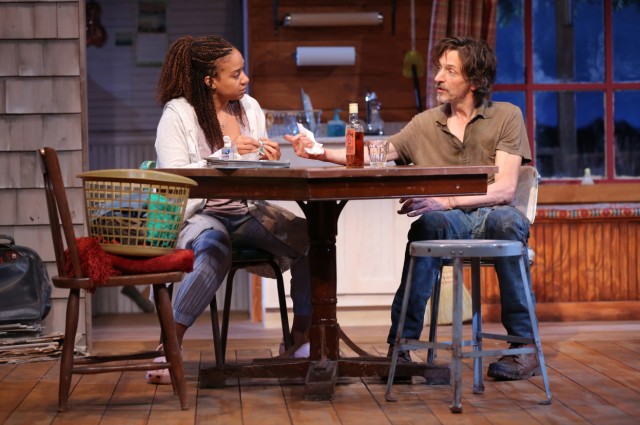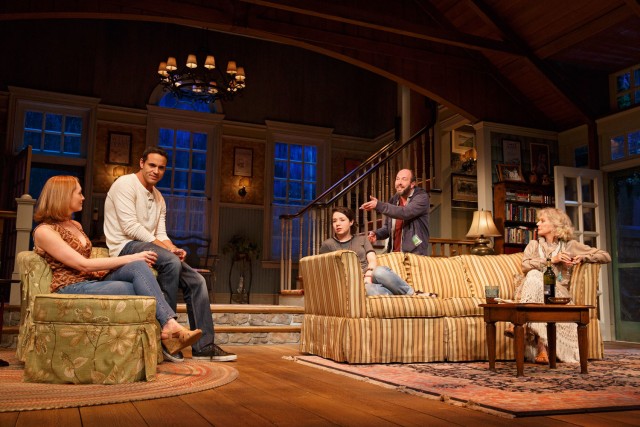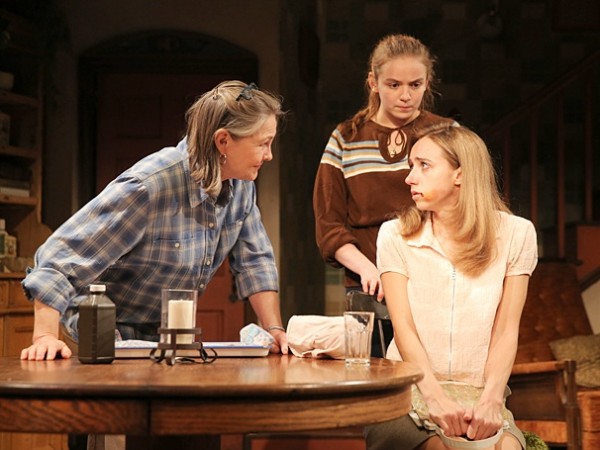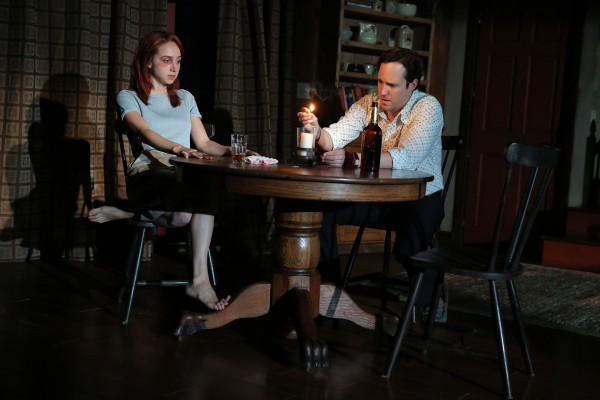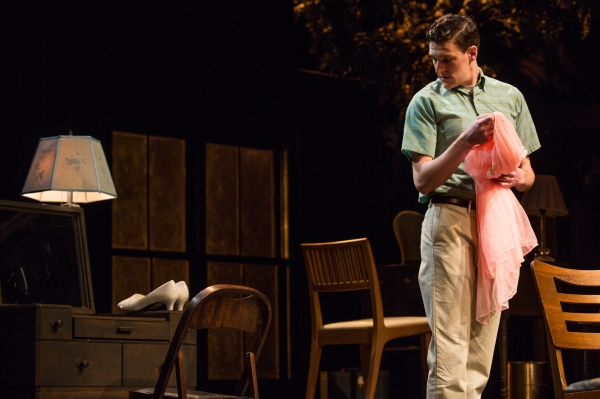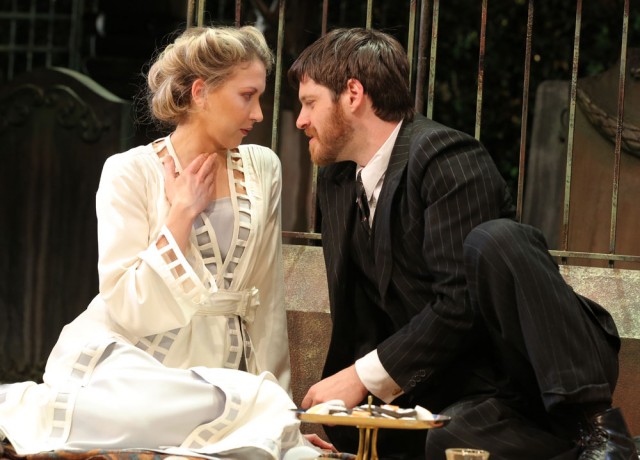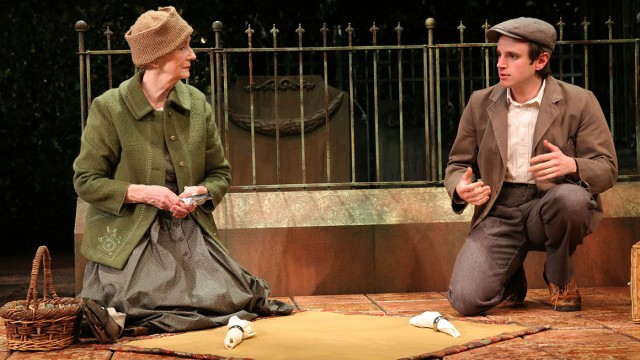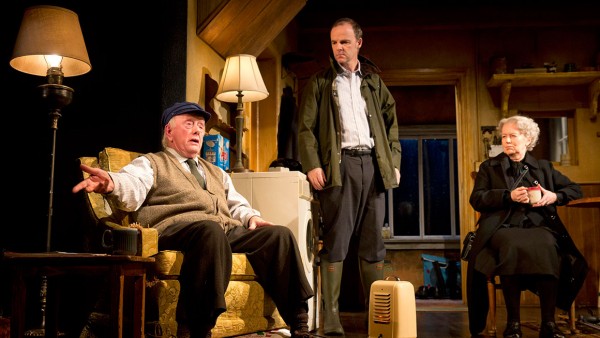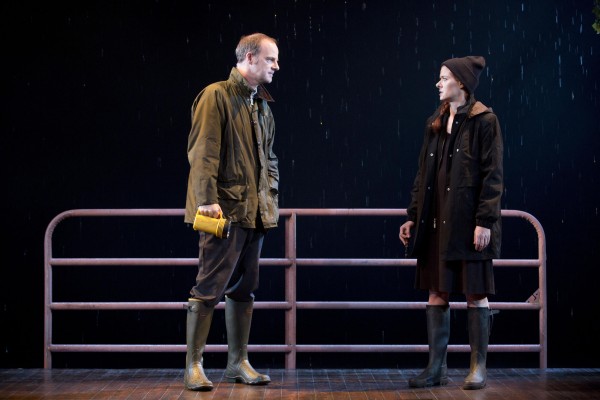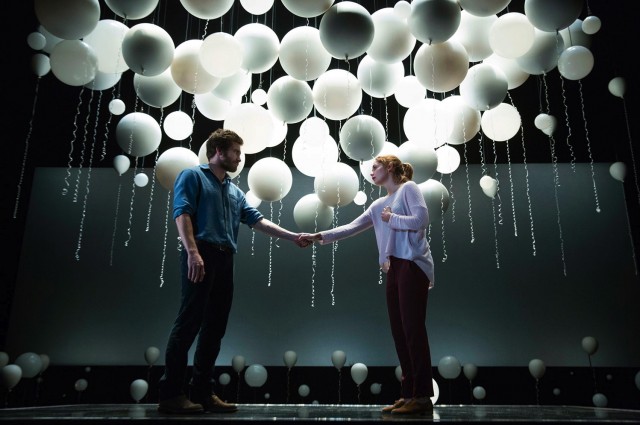
Beekeeper Roland (Jake Gyllenhaal) and cosmologist Marianne (Ruth Wilson) look at life and love from all sides in CONSTELLATIONS (photo © 2014 Joan Marcus)
Manhattan Theatre Club at the Samuel J. Friedman Theatre
261 West 47th St. between Broadway & Eighth Aves.
Tuesday – Sunday through February 28, $67-$125
www.manhattantheatreclub.com
www.constellationsbroadway.com
It takes several minutes to get into the flow and rhythm of Nick Payne’s Constellations, a two-character play set in the quantum multiverse, in the “past, present, and future.” Beekeeper Roland (Jake Gyllenhaal) and cosmologist Marianne (Ruth Wilson) meet in a bar, have a brief chat, the lights go out, then they do it again, and again. But each time, something changes — the tone of their voice, the movement of their bodies, their positioning onstage, a word here and there. What at first seems like it might be just a tiresome theatrical exercise turns out to be a captivating, sophisticated exploration of the many roads a relationship (and storytelling itself) can take. Over the course of seventy minutes, there are more than fifty short scenes as Roland and Marianne go through repeated iterations of hooking up and not, discussing their careers, being faithful and unfaithful, and, ultimately, facing mortality square in the face. Once you fall under the spell of the drama’s intellectual conceit, a scene won’t even be over before you’re eagerly anticipating how the next one will be slightly different. Constellations is no mere Sliding Doors rehash in which the protagonists have two choices that will take their lives in alternate directions, nor is it as black and white as the Star Trek episode “The Enemy Within,” in which each character has a good and evil version; instead, it posits that there are parallel universes in which Roland and Marianne are interacting at the same time, each one similar but unique — and each one, ultimately, ending in death, something that never changes.
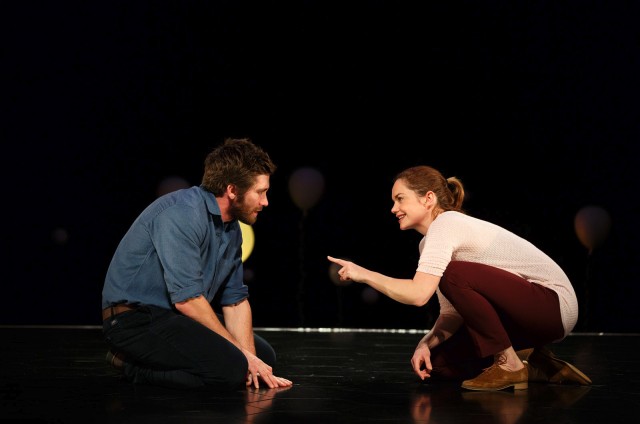
Jake Gyllenhaal and Ruth Wilson both excel in their Broadway debuts in superb Nick Payne play (photo © 2014 Joan Marcus)
In writing Constellations, Payne — who previously tackled climate change in If There Is I Haven’t Found It Yet, in which Gyllenhaal made his New York theater debut — was inspired by the work of Columbia physics and mathematics professor Brian Greene, the superstring theorist and author of the highly influential book The Elegant Universe, giving an intriguing, well-researched scientific edge to the play. While Marianne’s job has her studying the origin of the universe, Roland is a rooftop beekeeper, caring for insects whose very existence might determine the future of the planet. In her Broadway debut, Wilson, whose star has risen dramatically in just a few short years — the thirty-three-year-old actress has won two Olivier Awards and had starring roles in such well-received television series as Luther and The Affair — is sensational as Marianne, combining an innate intelligence with just the right amount of vulnerability. And in his Broadway debut, the thirty-four-year-old Gyllenhaal — who is currently up for an Oscar for his performance in Nightcrawler and has starred in such other films as Zodiac, Brokeback Mountain, and Proof — is a worthy partner as he keeps his character beguilingly unpredictable under the sure hand of Michael Longhurst, who previously directed Gyllenhaal in the Roundabout production of If There Is I Haven’t Found It Yet and Wilson in Arthur Miller’s The Crucible, when the two were at the University of Nottingham together. The play, which originated in London with Rafe Spall (Life of Pi, Betrayal), who also originated the role Gyllenhaal played in If There Is, and Sally Hawkins (Happy-Go-Lucky, Blue Jasmine), features a fascinating set designed by Tom Scutt, with lighting by Lee Curran; the actors remain on a central rectangular platform that is surrounded on three sides and above by balloons that represent stars, with different orbs glowing on and off in each scene. Constellations is a challenging, intellectually stimulating and satisfying work, expertly written, directed, and acted, but even with all the thought-provoking science, when it comes right down to it, it’s really just a, er, universal love story, as boy meets girl, then boy meets girl, then boy meets girl….
